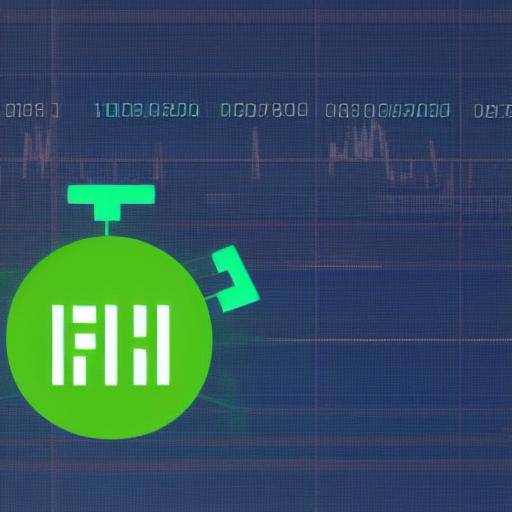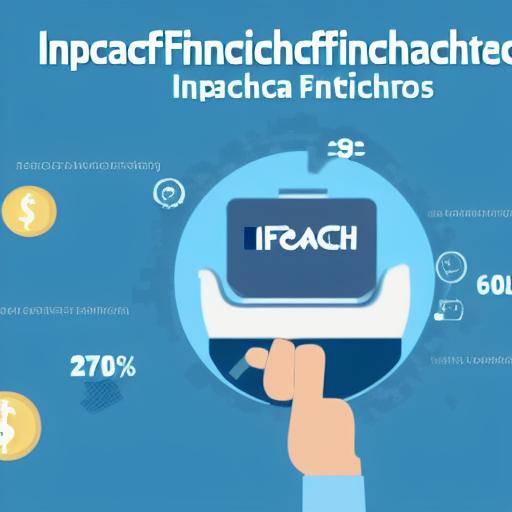
Technology has revolutionized the way we manage our finances, offering innovative tools that allow better control and greater efficiency in managing our money. In this article, we will explore the influence of financial applications on our financial health, analyzing how technology, control and efficiency are intertwined to create a positive impact on our lives. From its origin and evolution to its impact in the future, we will discover how these applications can make the difference in the way we handle our personal finances.
Introduction
With the accelerated advance of technology, financial applications have gained popularity as indispensable tools for the effective control and management of our finances. These platforms offer a wide range of functionalities ranging from cost monitoring to investment planning, providing users with the ability to organize and optimize their financial resources efficiently and conveniently. In this article, we will explore the fundamental role of financial applications in improving our financial health, as well as its influence on how we face the challenges of the current economic environment.
History and Background
The emergence of financial applications is closely linked to the evolution of technology and the changing needs of users in the financial field. From the arrival of the first financial management platforms to the current sophistication of mobile applications, we have witnessed a significant transformation in the way we interact with our money. With the widespread adoption of smartphones and constant connectivity, financial applications have succeeded in consolidating themselves as a vital tool for the daily management of our finances.
The creation of financial management platforms such as Mint, Quicken and Personal Capital marked a milestone in the history of financial applications by providing users with the possibility of centralizing their accounts and carrying out detailed tracking of their transactions. Over time, these applications evolved to incorporate advanced functions, such as budget planning, investment tracking and generation of personalized financial reports, giving users greater control over their monetary resources.
Deep analysis
The adoption of financial applications has shown multiple benefits to users, mainly in terms of control and efficiency in managing their finances. According to recent statistics, 73 per cent of users of financial applications claim to have a better understanding of their spending habits, allowing them to optimize their budgets and reduce unnecessary costs. In addition, 62 per cent of users show that these applications have helped them to increase their long-term savings, thanks to clear visualization of their financial objectives and adequate planning.
On the other hand, while financial applications have proved to be a valuable tool for financial control, they also pose challenges in terms of security and privacy. As financial data become increasingly digital, the protection of personal and financial information becomes a critical concern for users. However, developers continue to focus on improving the security of their platforms, implementing robust encryption and data protection measures to ensure the confidentiality and integrity of the financial information of users.
Comprehensive review
Financial applications cover a wide range of functionalities, from budget management to investment planning and tracking of financial habits. Given the diversity of options available, it is essential for users to understand best practices and strategies to optimize the use of these tools. Financial experts suggest that the key to maximizing financial applications lies in task automation, establishing clear financial targets and regular review of the personal financial situation. In addition, the use of personalized alerts and notifications can help users keep track of their finances and make informed decisions in real time.
In considering best practices, it is essential to recognize that financial applications are not a unique solution for all. Each user has unique financial needs and objectives, so the selection of the proper application should be based on a careful evaluation of the features offered, platform security and ease of use. Through a proactive and conscious approach, users can maximize the benefits offered by these applications, thus promoting greater long-term financial health.
Comparative analysis
By comparing the technology, control and efficiency of financial applications, interconnection between these elements is evident in the context of personal financial management. The technology acts as the vehicle that allows users to access advanced control and management tools, providing efficiency and comfort in managing their finances. This synergy between technology, control and efficiency results in greater capacity to make informed decisions, optimize resources and achieve financial goals with greater precision and excellence.
Practical Tips and Recommendations
By using financial applications, it is essential to maintain a proactive and open mindset for exploring new functions and tools offered by platforms. Here are some practical tips for maximizing the benefit of these applications:
- Automation of payments and savings: Leverage the programming function of payments and automatic savings to ensure consistency in financial management.
- Setting up cost alerts: Establishing notifications for close monitoring of expenditures and keeping track of the established budget.
- Explore investment features: If you have long-term investment goals, consider using the investment planning and tracking tools available in financial applications.
- Periodically review the financial reports: Analyze the reports and analyses provided by applications to identify financial trends, recurrent costs and savings opportunities.
Industry Perspectives and Expert Reviews
Financial and technology experts point out that the future of financial applications is in the integration of artificial intelligence and advanced data analysis to provide a personalized and real-time experience to users. The ability of these applications to understand spending patterns, identify savings opportunities and provide individualized financial recommendations is expected to continue to evolve, providing users with greater control and efficiency in managing their finances.
Emerging trends also aim at the inclusion of financial education and advising functions within applications, with the aim of empowering users with strong knowledge of financial management and strategic planning. It is also anticipated that financial applications will play a central role in promoting financial inclusion by offering affordable and accessible solutions for a wide range of users, including those traditionally marginalized by the conventional financial system.
Case Studies and Real Life Applications
To illustrate the impact of financial applications on real life, we present the case of Maria, a young professional who has managed to transform her financial approach through the use of a personal financial management application. By using the platform to set cost savings and tracking targets, Maria managed to reduce her debts, increase her savings and successfully plan her long-term investments. This case exemplifies how financial applications can empower users to take control of their finances and achieve their financial goals effectively.
Future Trends and Predictions
As we move forward, financial applications are expected to continue to evolve in response to changing user demands and the global financial landscape. Key predictions include:
- Increased customization: Financial applications will focus on providing even more personalized solutions, using advanced algorithms and predictive analysis to adapt to the individual financial needs of users.
- Integration with financial systems: Increased integration between financial applications and traditional financial systems is anticipated, allowing more fluid and cohesive management of finance for users.
- Expansion of financial education: Financial applications will play a key role in promoting financial education and responsible money management practices, providing users with access to comprehensive educational resources.
- Expansion of financial inclusion: Financial applications will work in collaboration with financial institutions to expand access to financial services and promote the inclusion of segments of the population that have historically been marginalized from the financial system.
Conclusion
In short, financial applications reflect significant developments in how we manage our finances, offering a powerful tool to improve our financial health through technology, control and efficiency. As these platforms continue to transform personal financial management, the importance of understanding their impact and harnessing their potential becomes increasingly crucial to ensuring informed and strategic financial decision-making. By adopting a conscious and proactive approach to the use of financial applications, users can strengthen their ability to effectively manage their financial resources and establish solid foundations for a prosperous financial future.
Frequently asked questions
1. What is the difference between financial applications and personal financial management platforms?
Financial applications typically offer a wider range of functions, ranging from budget management to investment planning, and are designed for use on mobile devices. On the other hand, the personal financial management platforms focus on the detailed administration of finance, providing complex financial reports and advanced analysis.
2. Are financial applications secure in terms of data protection?
Financial applications implement robust security measures, such as data encryption and multifactor verification, to protect the financial information of users. However, it is important to select applications from reliable sources and configure additional protection measures, such as the use of safe passwords and the authentication of two factors.
3. How to select the best financial application according to my needs?
The selection of a financial application depends on individual financial needs, so it is important to identify specific functionalities that are priority, such as budget management, investment tracking, or savings tools. It is also crucial to consider aspects of security and ease of use when choosing a financial application.
4. Is it possible to integrate financial applications with traditional financial systems, such as banks and financial entities?
Yes, many financial applications offer integration with bank accounts and other traditional financial systems, allowing for consolidated financial management. This integration can provide users with a holistic view of their financial resources and simplify the daily management of their finances.
5. What role do financial applications play in promoting financial inclusion?
Financial applications play a significant role in promoting financial inclusion by providing accessible and affordable solutions for finance management, enabling previously marginalized segments to access financial services and educational resources.
6. How can I maximize the benefit of financial applications to improve my financial health?
To maximize the benefit of financial applications, it is essential to adopt a proactive approach to financial management, establish clear financial targets and take advantage of the functionalities offered by applications to optimize financial resource management effectively and strategically.
Conclusion:
Financial applications have redefined how we manage our finances, offering a powerful means to improve our financial health through technology, control and efficiency. In this article, we have explored how these applications represent an invaluable tool for the effective management of our personal finances, contributing to informed and strategic financial decision-making. By understanding their impact and harnessing their potential, users can strengthen their ability to effectively manage their financial resources and establish solid foundations for a prosperous financial future.
Frequently asked questions:
- What is the difference between financial applications and personal financial management platforms?
- Are financial applications secure in terms of data protection?
- How to select the best financial application according to my needs?
- Is it possible to integrate financial applications with traditional financial systems, such as banks and financial entities?
- What role do financial applications play in promoting financial inclusion?
- How can I maximize the benefit of financial applications to improve my financial health?
This article has provided a detailed overview of financial applications, from its historical evolution to its future implications, highlighting its importance in promoting sound financial health for users. By adopting a proactive and conscious mindset, financial applications become powerful allys in the journey to financial stability and the achievement of long-term economic goals.






















































